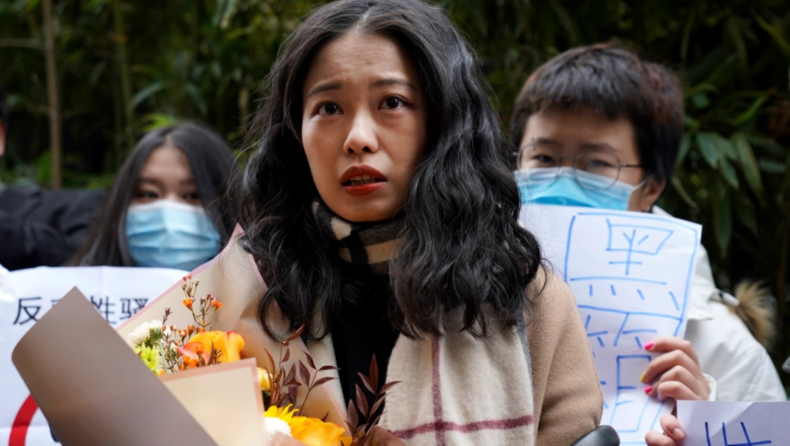On Wednesday, a Chinese court dismissed an appeal by a former state television intern challenging the rejection of her historic #MeToo case in which she accused a prominent presenter of sexual harassment.
According to Zhou Xiaoxuan, popularly known as Xianzi, she was 21-year-old when she worked on Zhu Jun’s show. Her statement accused Zhu Jun of grabbing and forcibly kissing her in a dressing room and soon she became the face of the nation’s #MeToo movement.
Zhu, who was 50 years old at the time of the purported occurrence, refuted the charge and sued Zhou for defamation. She then filed a countersuit, beginning a protracted court struggle that lasted years and coincided with a wider assault on feminism and online discussions of women’s rights by the Chinese Communist Party, which was in power at the time.
A Beijing court dismissed Zhou’s case in September of last year due to “insufficient evidence.” She responded by claiming that the court had not upheld procedural fairness. Zhou said that despite her repeated efforts, the court had refused to obtain supporting documentation such as security camera footage outside the changing room.
Her appeal was denied on similar grounds on Wednesday by Beijing Municipal No. 1 Intermediate People’s Court.
According to the court’s official Weibo account, “the court concluded that the evidence given by the appellant Zhou was not adequate to indicate that Zhu had sexually harassed her and hence the appeal could not be supported.”
Feminist activism in China
Zhou’s story was first publicized by Chinese media after her 2018 charges, and she received a lot of online support, gaining more than 300,000 followers on the microblogging platform Weibo.
Young Chinese feminists, however, have recently been subjected to more severe censorship as well as misogynistic abuse from the government and nationalist trolls.
Since last year, many of Zhou’s supporters’ Weibo accounts as well as her own have been blocked.
Online trolls have accused Zhou of lying and “colluding with foreign forces”—a standard Communist Party catchphrase frequently used by nationalists to attack anyone opposing the nation’s zero-Covid policy, including dissidents, intellectuals, and health professionals.
On Wednesday, security guards in plainclothes and police blocked off walkways outside the court to keep Zhou’s supporters from congregating, and the police also recorded the national ID numbers of passersby.
Zhou was greeted by a small group of admirers who handed her roses and held up signs of support on a playground nearby. “History and we the people are on your side, Xianzi,” one of them proclaimed.
Other people expressed their support online by sharing Zhou’s video. She taped a seven-minute video on Tuesday in which she implored supporters not to lose heart.
She said, “Fighting back is meaningful in and of itself. The social impact will be greater, I have never regretted taking the initiative and enduring everything. I hope everyone agrees with me that every effort counts.”
However, discussions of the case were severely restricted.
Some of the tweets regarding Zhou’s hearing on Weibo have been taken down, and Liang Xiaomen, a prominent Chinese feminist and public interest lawyer in New York claimed that her WeChat account was permanently restricted on Tuesday after she published details about the case and expressed support for Zhou.
Many online Xianzi supporters have been silenced, but her detractors and trolls are still active, according to Liang. Many of her supporters are quite concerned since their online community was shattered and they lack a place to gather and speak with one voice.













